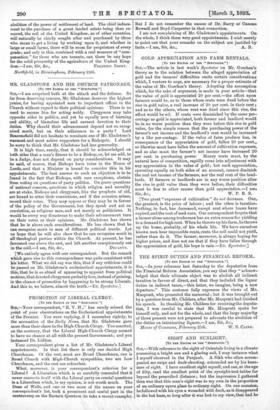MR. GLADSTONE AND HIS CHURCH PATRONAGE.
(To TER EDITOR or TEE " SPECTATOR."'
Sfa,—I am surprised both at the attack and the defence. So far from deserving censure, Mr. Gladstone deserves the highest praise, for having appointed men to important offices in the Church without regard to their political opinions. There is no need to excuse him for acting nobly. Clergymen may take opposite sides in politic, and yet be equally men of learning and ability, of blameless life and earnest devotion to their duties. Why should their advancement depend not on recog- nised merit, but on their adherence to a party P Lord Beaconsfield did not hesitate to nominate one of Mr. Gladstone's warmest and most active supporters for a Bishopric. I should be sorry to think that Mr. Gladstone had less generosity.
It is high time, surely, that it should be acknowledged on both sides that a man's fitness to be a Bishop, or, let me add, to be a Judge, does not depend on party considerations. It may be said, of course, that Bishops have votes in the House of Lords, and that a Minister is bound to consider this in his appointments. The best answer to such an objection is to be found in the fact that Bishops, with rare exceptions, abstain from voting on questions of party politics. On grave questions of national concern, questions in which religion and morality are at stake, Bishops and clergymen, like the prophets of old, are bound to utter their convictions, and if the occasion arises, record their votes. They may oppose or they may be in favour of the policy of the Government, but they speak and act on conviction, as religious men, and not merely as politicians. It would be every way disastrous to make their advancement turn on their votes or their opinions. Mr. Gladstone has shown that he is above such considerations. He has shown that he can recognise merit in men of different political creeds. Let -as hope that he will also show that he can recognise merit in all theological parties within the Church. At present, he has favoured one above the rest, and left another conspicuously out [We entirely agree with our correspondent. Bat the remark which gave rise to this correspondence was quite consistent with his letter. What we did say was this, that if any criticism could be passed on Mr. Gladstone's ecclesiastical appointments, it is this, that he is so afraid of appearing to appoint from political motives, that devoted clergymen probably lose, instead of gaining, in the chance of promotion by happening to be strong Liberals. And this is, we believe, almost the truth.—En. Spectator.]


































 Previous page
Previous page